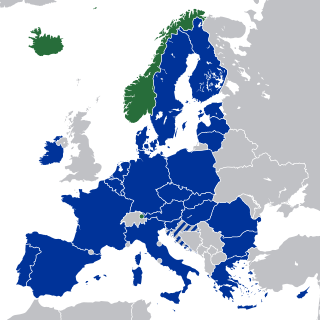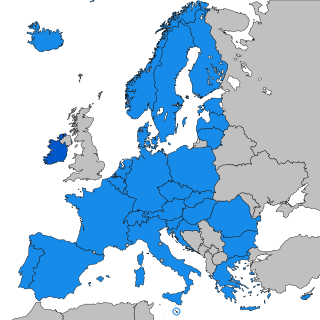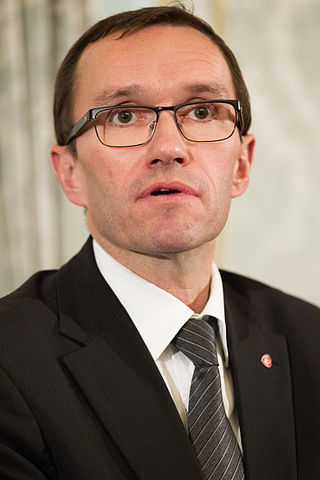
The Nordic Council is the official body for formal inter-parliamentary Nordic cooperation among the Nordic countries. Formed in 1952, it has 87 representatives from Denmark, Finland, Iceland, Norway, and Sweden as well as from the autonomous areas of the Faroe Islands, Greenland, and Åland. The representatives are members of parliament in their respective countries or areas and are elected by those parliaments. The Council holds ordinary sessions each year in October/November and usually one extra session per year with a specific theme. The council's official languages are Danish, Finnish, Icelandic, Norwegian, and Swedish, though it uses only the mutually intelligible Scandinavian languages—Danish, Norwegian, and Swedish—as its working languages. These three comprise the first language of around 80% of the region's population and are learned as a second or foreign language by the remaining 20%.
The foreign relations of Norway are based on the country's membership in NATO and within the workings of the United Nations (UN). Additionally, despite not being a member of the European Union (EU), Norway takes a part in the integration of EU through its membership in the European Economic Area. Norway's foreign ministry includes both the minister of foreign affairs and minister of international development.

The European Economic Area (EEA) was established via the Agreement on the European Economic Area, an international agreement which enables the extension of the European Union's single market to member states of the European Free Trade Association. The EEA links the EU member states and three of the four EFTA states into an internal market governed by the same basic rules. These rules aim to enable free movement of persons, goods, services, and capital within the European single market, including the freedom to choose residence in any country within this area. The EEA was established on 1 January 1994 upon entry into force of the EEA Agreement. The contracting parties are the EU, its member states, and Iceland, Liechtenstein, and Norway. New members of EFTA would not automatically become party to the EEA Agreement, as each EFTA State decides on its own whether it applies to be party to the EEA Agreement or not. According to Article 128 of the EEA Agreement, “any European State becoming a member of the Community shall, and the Swiss Confederation or any European State becoming a member of EFTA may, apply to become a party to this Agreement. It shall address its application to the EEA Council.” EFTA does not envisage political integration. It does not issue legislation, nor does it establish a customs union. Schengen is not a part of the EEA Agreement. However, all of the four EFTA States participate in Schengen and Dublin through bilateral agreements. They all apply the provisions of the relevant Acquis.

The University of Tromsø – The Arctic University of Norway is a state university in Norway and the world's northernmost university. Located in the city of Tromsø, Norway, it was established by an act of parliament in 1968, and opened in 1972. It is one of ten universities in Norway. The University of Tromsø is the largest research and educational institution in Northern Norway and the sixth-largest university in Norway. The university's location makes it a natural venue for the development of studies of the region's natural environment, culture, and society.

The Schengen Information System (SIS) is a governmental database maintained by the European Commission. The SIS is used by 31 European countries to find information about individuals and entities for the purposes of national security, border control and law enforcement since 2001. A second technical version of this system, SIS II, went live on 9 April 2013. An upgraded Schengen Information System entered into operation on 7 March 2023.

Josep Borrell Fontelles is a Spanish politician serving as High Representative of the Union for Foreign Affairs and Security Policy since 1 December 2019. A member of the Spanish Socialist Workers' Party (PSOE), he served as President of the European Parliament from 2004 to 2007 and as Minister of Foreign Affairs, European Union and Cooperation in the Government of Spain from 2018 to 2019.

The University of Klagenfurt is a federal Austrian research university and the largest research and higher education institution in the state of Carinthia. It has its campus in Klagenfurt.
Aegean Airlines S.A. is the flag carrier of Greece and the largest Greek airline by total number of passengers carried, by number of destinations served, and by fleet size. A Star Alliance member since June 2010, it operates scheduled and charter services from Athens and Thessaloniki to other major Greek, European and Middle Eastern destinations. Its main hubs are Athens International Airport in Athens, Macedonia International Airport in Thessaloniki and Larnaca International Airport in Cyprus. It also uses other Greek airports as bases, some of which are seasonal. It has its head office in Kifisia, a suburb of Athens.

Switzerland is not a member state of the European Union (EU). It is associated with the Union through a series of bilateral treaties in which Switzerland has adopted various provisions of European Union law in order to participate in the Union's single market, without joining as a member state. Among Switzerland's neighbouring countries, all but one are EU member states.

Copernicus is the Earth observation component of the European Union Space Programme, managed by the European Commission and implemented in partnership with the EU Member States, the European Space Agency (ESA), the European Organisation for the Exploitation of Meteorological Satellites (EUMETSAT), the European Centre for Medium-Range Weather Forecasts (ECMWF), the Joint Research Centre (JRC), the European Environment Agency (EEA), the European Maritime Safety Agency (EMSA), Frontex, SatCen and Mercator Océan.

The visa policy of the Schengen Area is a component within the wider area of freedom, security and justice policy of the European Union. It applies to the Schengen Area and to other EU member states except Ireland. The visa policy allows nationals of certain countries to enter the Schengen Area via air, land or sea without a visa for up to 90 days within any 180-day period. Nationals of certain other countries are required to have a visa to enter and, in some cases, transit through the Schengen area.

Espen Barth Eide is a Norwegian politician and political scientist. He is currently serving as the Minister of Foreign Affairs in Jonas Gahr Støre's government, having previously done so under Jens Stoltenberg. He has been a been a member of the Norwegian Parliament since 2017, representing the Labour Party. He was elected to this seat in the 2017 election, and reelected in the 2021 election. From 2017 to 2021, Eide was the Labour Party's spokesperson for Energy, Climate and Environment.

There are nine recognised candidates for membership of the European Union: Albania, Bosnia and Herzegovina, Georgia, Moldova, Montenegro, North Macedonia, Serbia, Turkey, and Ukraine. Kosovo formally submitted its application for membership in 2022 and is considered a potential candidate by the European Union.

European University Sports Association (EUSA) is an umbrella non-governmental (NGO) non-profit organisation, working in the field of university sport in Europe.

National identity cards are issued to their citizens by the governments of most European Economic Area (EEA) member states, the exceptions are Denmark and Ireland. Ireland however issues a passport card which is a valid document in the EEA and Switzerland. Denmark issues simpler identity cards that are not valid as travel documents. From 2 August 2021, new identity cards are harmonized as a common identity card model replaced the various formats already in use. There are approximately 200 million national identity cards in use in the EU/EEA, including 53 million of the new EU-standard cards. They are compulsory in 14 EU countries, voluntary in 9 countries and in 8 countries they are semi-compulsory. Where the card is compulsory, in some member countries it is required to be carried at all times, while in other countries the mere possession of the card is sufficient.

The Cyprus Space Exploration Organisation (CSEO) is a non-governmental, nonprofit, science organisation, based in Cyprus, with a global scope of service and activities. Its main functions are research and development, space advocacy, and international cooperation in the field of space exploration, astronautics and astronomy. Education and outreach are also an important part of its mission as International Astronomy Education Center.
Open access scholarly communication of Norway can be searched via the Norwegian Open Research Archive (NORA). "A national repository consortium, BIBSYS Brage, operates shared electronic publishing system on behalf of 56 institutions." Cappelen Damm Akademisk, Nordic Open Access Scholarly Publishing, University of Tromsø, and Universitetsforlaget belong to the Open Access Scholarly Publishers Association. Norwegian signatories to the international "Open Access 2020" campaign, launched in 2016, include CRIStin, Norsk institutt for bioøkonomi, Norwegian Institute of Palaeography and Historical Philology, Norwegian University of Science and Technology, Oslo and Akershus University College of Applied Sciences, University of Tromsø, University of Bergen, University of Oslo, and Wikimedia Norge.
Horizon Europe is a 7-year European Union scientific research initiative, successor of the Horizon 2020 programme and the earlier Framework Programmes for Research and Technological Development. The European Commission drafted and approved a plan for Horizon Europe to raise EU science spending levels by 50% over the years 2021–2027.
Marc Lanteigne is a Canadian political scientist originally from Montréal. He is associate professor of Political Science at the Arctic University of Norway, Tromsø, teaching international relations (IR), comparative politics, security studies and comparative political economy. Prior to that, Lanteigne was a Senior Research Associate at Department of East Asian Studies, Ruhr University Bochum, and Senior Lecturer at the Centre for Defence and Security Studies (CDSS) at Massey University in Auckland. He is Editor-in-Chief of an Arctic news website Over the Circle, a part-time lecturer at Peking University, an adjunct researcher at the Centre for Arctic Studies at the University of Iceland, Reykjavík, and a member of the board of the UK-based Polar Research and Policy Initiative (PRPI).












